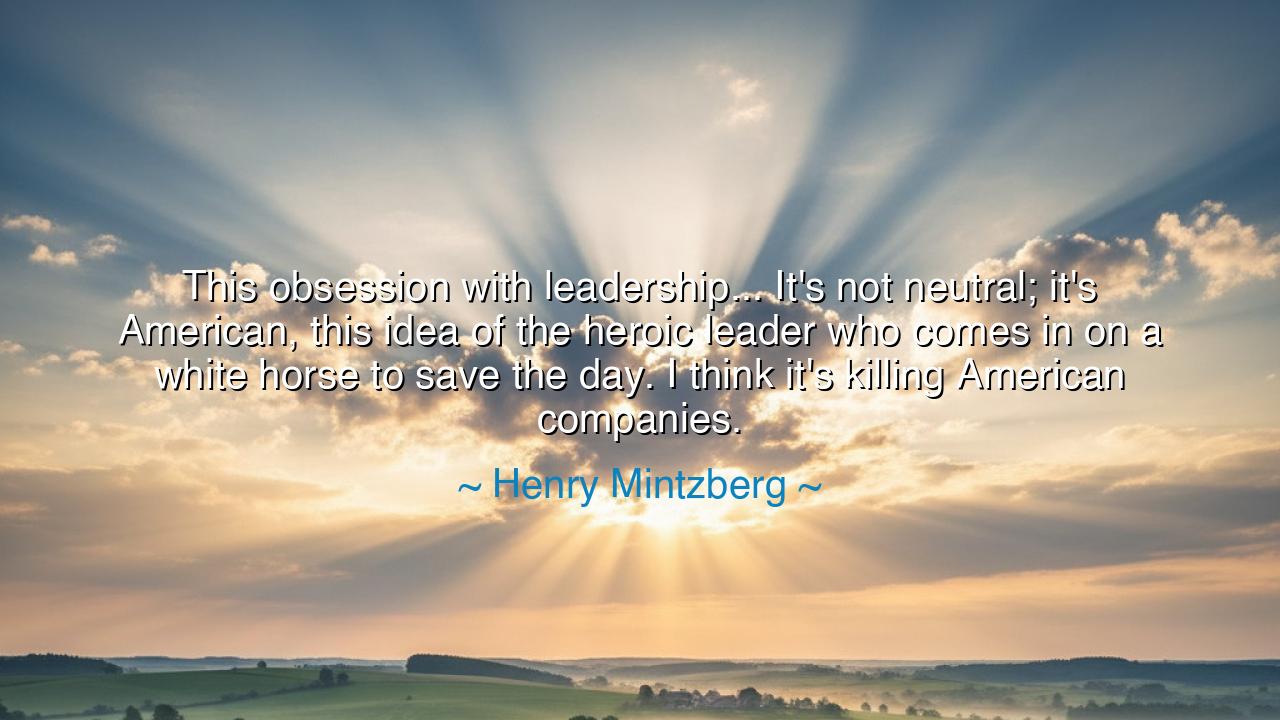
This obsession with leadership... It's not neutral; it's
This obsession with leadership... It's not neutral; it's American, this idea of the heroic leader who comes in on a white horse to save the day. I think it's killing American companies.






“This obsession with leadership... It’s not neutral; it’s American, this idea of the heroic leader who comes in on a white horse to save the day. I think it’s killing American companies.” – Henry Mintzberg
In these sharp and prophetic words, Henry Mintzberg, the great scholar of management and organizational life, raises a torch to expose one of the modern age’s most seductive illusions—the cult of the heroic leader. His warning is not spoken in bitterness but in wisdom: that the obsession with individual saviors has led institutions to worship personality over purpose, charisma over collaboration, and appearance over substance. His voice echoes like that of an ancient philosopher who has seen empires fall because they mistook spectacle for strength. For Mintzberg, leadership, when exalted beyond its proper bounds, becomes a poison to the very systems it was meant to guide.
The meaning of this quote lies in its critique of a myth—the “white horse” fantasy that dominates much of modern American thought. We have been taught to revere the image of the lone leader, the visionary who descends from above to rescue failing enterprises, to revolutionize industries, to “save the day.” But this myth blinds us to a deeper truth: organizations, like societies, are not sustained by a single hero, but by the collective wisdom and effort of many. Mintzberg reminds us that the health of an organization depends not on the brilliance of one, but on the commitment of all. The moment leadership becomes a performance for admiration rather than a service for progress, the rot begins.
The origin of Mintzberg’s insight comes from decades of studying real managers—people who quietly build, organize, and nurture the structures that allow work to thrive. He found that effective leadership was rarely glamorous. It was humble, human, and grounded. It required listening more than commanding, facilitating more than directing. Yet in America, where culture prizes the heroic individual—the lone cowboy, the self-made millionaire, the charismatic CEO—such quiet forms of stewardship are often overlooked. Thus, companies rise and fall upon the backs of stars who promise miracles but leave behind confusion. The “obsession with leadership,” he warns, has become an idol that distracts from the deeper work of management, community, and shared purpose.
History provides sobering examples of this truth. Consider the collapse of Enron, once hailed as one of America’s most innovative corporations. Its leaders were celebrated as geniuses—decisive, daring, visionary. But behind their charisma lay arrogance and deceit. The company’s downfall came not from lack of leadership, but from too much of it—leadership without morality, vision without humility. The cult of the heroic CEO blinded both employees and investors to the absence of accountability beneath the shining surface. In contrast, companies that have endured—like Toyota or IBM in their strongest eras—succeeded not through flamboyant leaders, but through collective intelligence, discipline, and a culture of continuous improvement.
Mintzberg’s message cuts deeper still. He teaches that true leadership is not the act of riding in to save, but of staying to serve. The heroic model is fleeting—it arrives with noise and leaves with glory—but the genuine leader builds from within, often unseen, like a gardener tending the soil. The obsession with the “savior” blinds us to the truth that greatness is rarely sudden. It grows in teams that trust each other, in managers who listen to workers, in organizations that value process over prestige. To glorify the individual is to forget the ecosystem that makes leadership possible in the first place.
This critique is not merely about business—it is about civilization. The American ideal of heroism, born from frontier myth and capitalist triumph, has shaped not only companies but politics, culture, and education. We crave saviors—leaders who promise to fix everything, to restore order with one grand gesture. Yet such saviors often leave devastation behind, for they teach dependency, not strength. The truest form of leadership, Mintzberg reminds us, is not dominance but partnership. It is a shared enterprise of human beings striving toward a common purpose, where power flows through, not over, others.
The lesson, then, is clear: we must unlearn the worship of the hero and rediscover the wisdom of the community. Seek not leaders who boast, but those who build; not those who arrive on white horses, but those who walk beside their people. The next generation of organizations will not be saved by charismatic rulers, but by collaborative architects—leaders who see themselves as part of a whole. Let each of us, in whatever sphere we inhabit, practice this humbler, truer leadership: to serve first, to listen deeply, to strengthen others. For as Henry Mintzberg warns, the age of heroic leaders may dazzle for a moment, but it cannot endure. Only the leadership that is shared, rooted in purpose and humility, can sustain the world that is yet to come.






AAdministratorAdministrator
Welcome, honored guests. Please leave a comment, we will respond soon